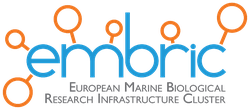Research Infrastructures - EMBRIC
H2020 RI
The EMBRIC (European Marine Biological Research Infrastructure Cluster) project resulted from the UGent involvement in the ESFRI research infrastructure EMBRC (European Marine Biological Resource center) and is designed to accelerate the pace of scientific discovery and innovation from marine bioresources.
In order to unlock the vast potential of marine organisms EMBRIC will interconnect science, industry and policy. By clustering existing regional research infrastructures, joint scientific-industrial developments, facility access and technology & knowledge transfer will be facilitated. EMBRIC will, over the next 4 years, directly connect 27 partners (universities, institutions, non-for-profit and SME’s) to foster innovations in marine biotechnologies in mainly two specific sectors, namely: marine natural product discovery and aquaculture marker-assisted fish selection. The EMBRIC headquarters, situated in Paris (UPMC) under the coordination of Prof. Bernard Kloareg (UPMC, Roscoff) and its partners will bring Europe’s Marine Blue Bio-economy forward.
Objectives
These are the objectives of EMBRIC:
- Develop common practices and high quality services for access to marine biological, analytical and data resources
- Strengthen the science-industry connection by supporting and engaging technology and knowledge transfer
- Geographically defragment public and private-sector blue-biotechnology communities by involving regional research, development and innovation policy makers with EMBRIC
Role of Ghent University
The role of the Ghent University is twofold:
- The marine biology research group, which has a long tradition in coordinating training activities will be responsible for building a supporting framework to organize training opportunities and exchange of technology, knowledge and best practice (see https://www.ugent.be/we/biology/en/research/marbiol and www.marinetraining.eu)
- The laboratory of protistology and aquatic ecology will contribute to breeding and analysing improved microalgae for blue biotechnology applications (see www.pae.ugent.be)
Contact
Prof. Dr. Ann Vanreusel
Department of Biology
Marine Biology research group
Phone number: 09/264.85.21
E-mail: Ann.Vanreusel@UGent.be
Dr. Thibaud Mascart
Department of Biology
Marine Biology research group
Marine Training Platform
Phone number: 09/264.85.16
E-mail: Thibaud.Mascart@UGent.be
Dr. Tim Deprez
Department of Biology
Marine Biology research group
Marine Training Platform
Phone number: 09/264.85.26
E-mail: Tim.Deprez@UGent.be
Prof. Dr. Wim Vyverman
Department of Biology
Protistology and aquatic ecology
Phone number: 09/264.85.01
E-mail: Wim.Vyverman@UGent.be
